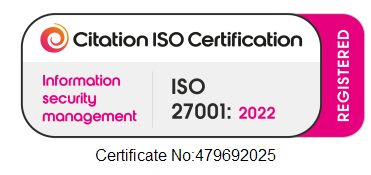Moving forward with a digital marketing strategy without keyword research is like standing in a room and shouting answers to questions that no one is asking. Keyword research is important because it allows you to understand what your audience is searching for, what their intent is and estimate whereabouts they are in their purchase journey by the types of queries they are searching for.
Top 3 reasons why keyword research is important:
- Relevant Content 📖: Create and adapt your website content to answer the search queries of your audience.
- Increased Web Traffic & Leads 📈: Rank higher in the SERP for search queries that provide an opportunity for you. Higher rankings will lead to a higher CTR, increased web traffic and increased leads/sales.
- Search intent 🔎: It helps you to understand and identify the search intent of your audience and match this to your buyer journey in your sales funnel.
“Keywords” are often used synonymously with “search query” but in reality your “search query” is something that contains your keyword. Simply put, a search term or “search query” is what an individual searches for in a search engine (like Google) but a keyword is often what describes your product, content or service.
Having said that, they are often interchangeable and one part of keyword research is understanding when a search query is actually a good keyword opportunity because it possesses things such as good average monthly search volume and low competition. I will talk about this more later in the article, but you can skip to this section if you wish.
Moving forward with a digital marketing strategy without keyword research is like standing in a room and shouting answers to questions that no one is asking.
The importance of keyword research - Storytime!
The best way of demonstrating how important keyword research is to share a story from a recent SEO consultancy session we were involved in. We were helping a client in the charity sector who had been gradually creating new content for the website over a number of years. They had an excellent, mature blog with good quality and helpful content that was super-relevant to their audience and services. They had over 100 blog articles on their website but they had hardly any keyword rankings.
The reason for this?- they were shouting answers to questions that were not being asked.
What I mean by this is that each one of their blogs had not been developed with the help of some solid keyword research. They just wrote about things that they thought would be helpful to their audience, rather than researching what their audience is actually looking for and creating content to answer the questions that people are asking.
We also covered this in a recent episode of SEOs Getting Coffee where we discuss keyword research.
Quick keyword research with Semrush
Let’s take an example, pretend you’re a plumber again and you decide to write a blog for your website on “fitting a walk-in shower tap”.
Let’s do some keyword research on this. In this example, I’m using semrush.
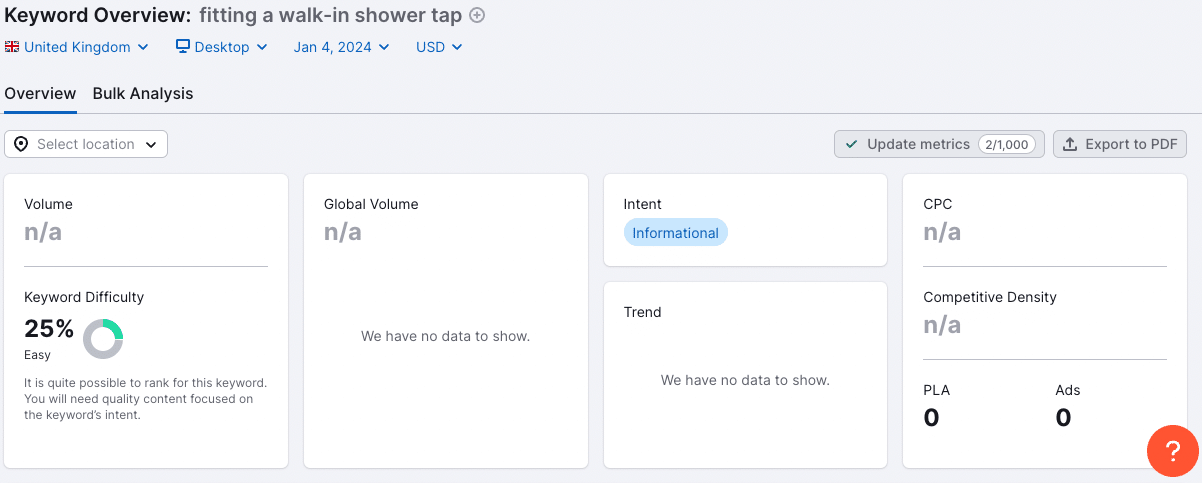
As you can see, this particular search query returns no data for the estimated average monthly search volume. This indicates that not many people (if any!) are searching for this particular query.
So what are they searching for instead?
Again, we can do some keyword research to find an alternative and similar search query that people ARE searching for.
For example, try going a little less specific and research “fitting a walk-in shower”.
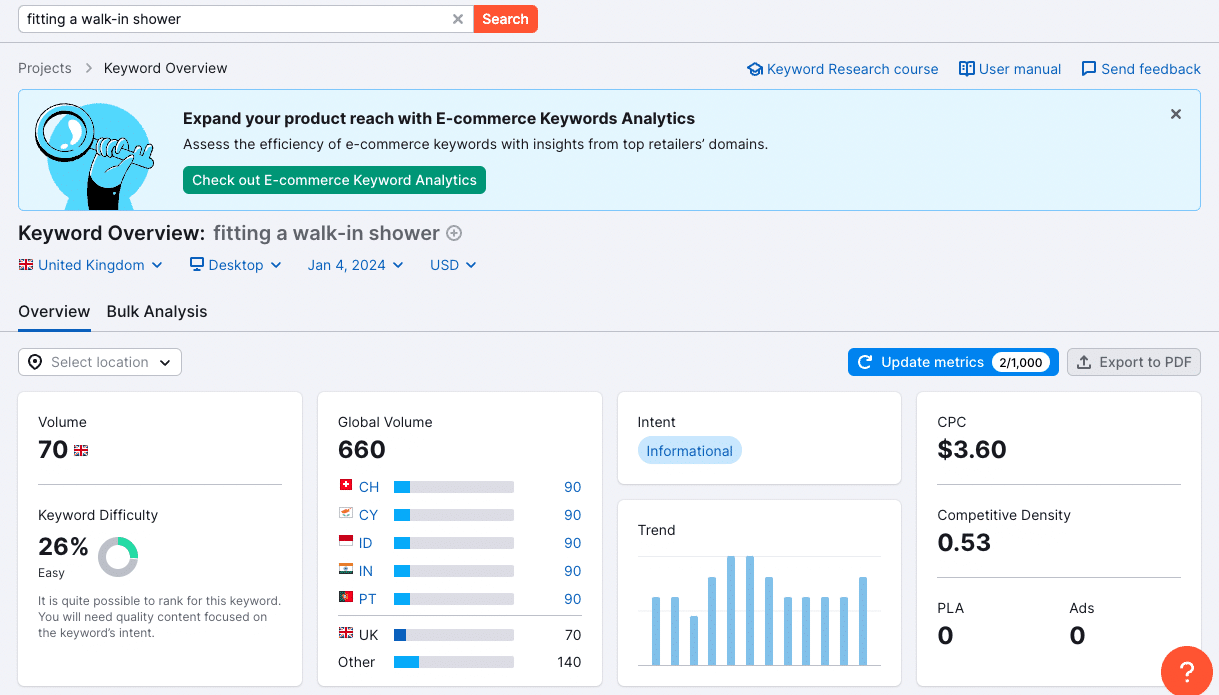
And as we can see, we now have found some search volume. This shows us something that people are searching for, and it also shows us that it’s a relatively low competition search query.
So instead of writing a blog article about “fitting a walk-in shower tap” that no one is searching for, write a blog about “fitting a walk-in shower” instead because that’s what people ARE searching for.
OR…
If we take a further look, semrush also shows us some other possible variations of what people are searching for and we can even uncover some possible alternatives.
For example, we can see that “installing” and “installation” is also a keyword that people use.
So another possible option would be to write the blog titled “installing a walk in shower”.
So if we stack those up side by side:
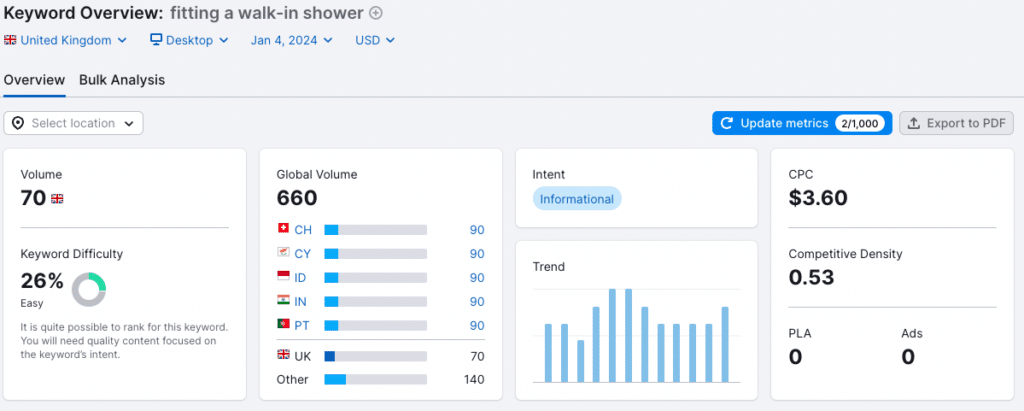
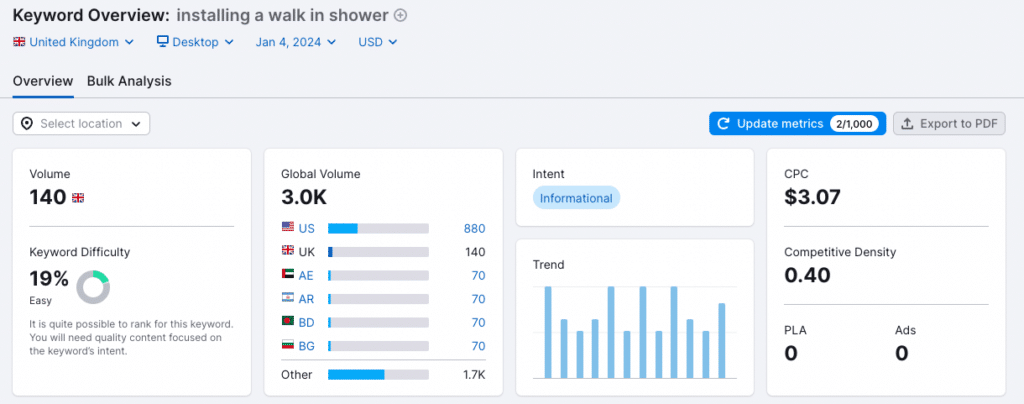
“fitting a walk-in shower” – avg. search vol. – 70. Keyword difficulty – 26%
“installing a walk-in shower” – avg. search vol. – 140. Keyword difficulty – 19%
You could go for either of these but I think the better choice would be “installing a walk-in shower” as it has a slightly higher average search volume and has a slightly lower estimated difficulty.
This keyword research tactic is also at the heart of keyword & content mapping. The purpose of which being to analyse your existing content and look to see if your keyword targeting needs to be adjusted based on new data trends in your keyword research and to also map your content to the intent of your audience.
A note on the keyword difficulty metric
When we talk about keyword difficulty, this is a metric that the SEO software semrush uses to estimate the perceived competitiveness of a particular keyword based on a variety of factors. You will find that other SEO software will also use their own estimation of a keyword difficulty metric too. Please remember it’s an estimate and should not be taken as being 100% accurate. Please also remember that there are other SEO aspects to consider when writing your blog post or article in order to give it the best chance of ranking high in the SERP (search engine results page).
Read more: Top SEO tools for digital marketers
Why is Keyword Research important for SEO?
Keyword research is the difference between success and failure in your SEO strategy. As explained in the previous paragraphs, you can be writing incredible content that’s super helpful but if it’s not targeted towards the keywords people are searching for, or the keywords that are relevant to you and your business, then you won’t see the benefit of quality traffic to your website (if any traffic at all).
The main aim of keyword research is to identify a keyword that you can optimise your website content towards in order to rank higher in the SERP and therefore receive increased traffic and sales/leads.
Keyword research done right can lead to increased web traffic, increased sales and an overall better user experience, as well as giving you a competitive edge in your industry.
Keyword Research and Audience Intent
One major thing about keyword research for SEO that is often overlooked is the fact that the whole process also helps you to understand your audience better. It helps you to identify the difference in search intent and at what stage the person is in their purchase journey.
To give an easy example of search intent, someone who is searching for “the best winter running shoes” has a different intent than someone who searches “buy winter running shoes”. We might assume in this scenario that the person searching for the former term is in the research/engagement phase whereas the person who is searching for the latter query is in the purchase phase. And it’s important to match this up and determine where your content aligns with the top of, middle of and bottom of your sales funnel (ToFu, MoFu, BoFu).
You may choose to do this by determining that the different stages of your funnel are in 3 or more stages.
Perhaps something like:
- Awareness
- Consideration
- Sales
You can then map your content to these stages.
Let’s use an ecommerce example and we’ll use the “winter running shoes” search term from before:
| Funnel | Stage | Content type |
| ToFu (top of funnel) | Awareness | Questions, discovery content. e.g are trail running shoes good for winter? |
| MoFu (middle of funnel | Consideration | Reviews, comparison guides, product demos e.g best waterproof running shoes for winter |
| BoFu (bottom of funnel) | Sales (& loyalty) | Customer stories, case studies, product pages/guides, FAQs e.g buy winter running shoes |
In summary, your content will suit different search intent and can be categorised accordingly in your content plan. This way, you can nurture your audience as well as take steps to consider where your other marketing channels can come in, for example email marketing or paid media (paid search or paid social).
Keyword Research isn’t just for SEO or PPC/Paid Media. It informs your multi-channel marketing strategy as you look to guide your audience through your sales funnel.
When does a keyword become a keyword?
We briefly mentioned the search query and keywords at the start of this article and promised to come back to this point. It might be an argument on semantics but it’s good for us to clarify this part of the keyword research process. These are actually two different things by definition (like Wordstream explains in their article), a search query is anything that is entered into the search engine. A keyword is the term used to describe your content. As SEOs, a part of our job is to try and connect these two things.
When you’re doing keyword research, you’ll actually be looking at and researching search queries. You will find more popular search queries that are searched more often and you’ll find some search queries that are not being answered very well, therefore identifying a content gap and a lower difficulty search query to rank for. Technically, it becomes a keyword when you decide to target that search query (it becomes your keyword). However, people tend to use both interchangeably, although it’s not quite accurate.
Like I showed with the previous example. We looked at what search queries were actually being searched for and adjusted our keyword accordingly.
Summary of keyword research’s importance
In summary, remember what I said at the beginning of this article. Starting SEO or any digital marketing strategy without keyword research is like shouting answers to questions no one is asking. Keyword research is about listening to your audience and understanding their search queries in order to provide them with the answers they are looking for.
It all starts with keyword research! But if it was that easy to rank on the first page of the SERP with just some tidy keyword research then we’d all be doing it! Remember that Keyword Research is just one part of the SEO pie and it needs to be combined with other SEO strategies to give you the best chance of ranking. Your on-page SEO needs to be right, your content writing needs to give value and be helpful to your readers and you need to make sure that your technical SEO side is also up to scratch. These are just a few examples but you get the idea, the skill in SEO is about bringing all of these things together to put your website in the best possible position for SERP rankings.
Don’t hesitate to reach out to us if you need help with SEO or read more from our blog via the links below. 👋










